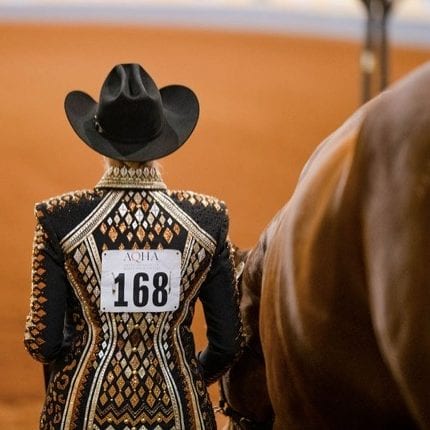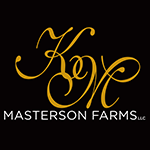When equestrians think about staying in a frame in the show pen, we’re usually thinking about our horses. However, staying in the right frame of mind, or maintaining your focus, is paramount to success.
We all know that showing horses is as much a mental sport as it is a physical one, but how can we train our minds for better performance?
The great thing about focus is that you’re only limited by what you’re willing to work on, unlike some of the physical aspects of riding.
Read on for the research-based strategies GoHorseShow has compiled to help you put focus in the spotlight.
We bet you’ll be ready to set aside some focus time when you consider all of the things that better focus helps you accomplish: ignoring distractions, calming your nerves, showing through mistakes and more.
Tip #1: Define Your Focus
What is focus in the first place? While this seems obvious, paying attention, attention itself is a pretty complex cognitive process. According to computational neuroscientist Mehdi Ordikhani Seyedlar, “Many people think that attention is all about what we are focusing on, but it’s also about what information our brain is trying to filter out.”
This is particularly useful to consider when applying this focus fact to the horse show environment where we are filtering out more than we can keep track of: people in the stands, that loose dog running under the fence, the horses around you, your trainer’s watchful gaze, that spot of highlighter on your sleeve that your horse gifted you at the last second before entering the pen.
Seyedlar’s next observation – there are two ways to direction your attention. He explains, “First, there’s overt attention. In overt attention, you move your eyes towards something to pay attention to it,” he explains.
He continues, “Then, there’s covert attention. In covert attention, you pay attention to something, but without moving your eyes. Think of driving for a second. Your overt attention, your direction of the eyes, is in front, but it’s your covert attention which is constantly scanning the surrounding area, where you don’t look at them.”
The takeaway: Showing your horse requires both overt and covert attention, but to be in focus, you need to be driving both. If you find your eyes wandering to the stands, you’re losing focus where it matters, your moment-by-moment performance, by switching from covert to overt. Merely being aware of the two ways to direct your attention will keep your mind, and performance, from bouncing all over the place.
Tip #2: Go with the “Flow”
Have you ever been so absorbed in something, like practicing lope-overs, that you find when you finally stop, you’re surprised to see how much time has passed?
This is a particularly wonderful kind of focus known in the psychological field as “flow.” World-renowned psychologist, Mihaly Csikszentmihalyi pioneered the study of flow, and the concept of flow has been applied to everything from business to personal happiness.
According to Csikzentmihalyi, flow is “the mental state of operation in which a person performing an activity is fully immersed in a feeling of energized focus, full involvement and enjoyment in the process of the activity.”
You can think of this as being ‘in the zone.’ Csizkzentmihalyi’s research revealed that flow was something that all brilliant and successful people had in common; the top athletes, musicians, leaders he studied all reported this level of focus in their work.
To put your focus in the flow zone while showing, you need to to do two things. First, leave your goals at the tack stall. While it is essential to have clear goals, getting into focus means you need your thoughts to live in the present, rather than stressing about qualifying points or prizes.
Second, you need to assess whether or not your ability to flow in the show ring has to do with how well your skill level is matched to the activity. To reach flow, an activity has to be appropriately challenging. If it is too easy, you’ll lose focus due to boredom, but, if the task is too difficult, you’ll lose focus through anxiety or demotivation.
If you find that it is hard to be completely immersed in your showing, it will be helpful to have a conversation with your trainer about how you can better match your skill level to a task. This could mean more intentional practice to up your skill level in certain areas, or it might involve selecting a more challenging event to add.
The takeaway: While you’re probably not going to hit perfect ‘flow’ every time you step in the pen, it’s a great type of focus to shoot for, and it is often the almost indefinable element that is behind so many great winning runs.
Tip #3: Take Note
“When is the last time you did nothing for ten minutes?” asks mindfulness expert Andy Puddicombe. And when he says nothing, he means it – no eating, drinking, emailing, texting, TV or anything. Most of us probably can’t name a time when we’ve truly been doing nothing, because life itself is busy, which lends itself to a busy mind.
Horse shows are even busier, with the chaotic schedules and the fact that we’re always doing something. Research on mindfulness practices indicates that this very business can make it difficult to clear your mind and focus when you need to, without being distracted by one of the many pestering thoughts that pop-up in your headspace.
Puddicombe suggests that trying it for just ten mindful minutes a day can help you regain calm and focus. One technique Puddicombe champions is noting, which is particularly useful for show-ring application, here’s why: Some exhibitors struggle with focus because they’re trying to control every single thought, from the thoughts like mental reminders to cue their horse at cone A to nervous thoughts like, “Am I going to get the points I need to qualify?”
When you try to control your thoughts, it often results in frustration because controlling your thoughts distracts you from being present in your performance and can be derailing. Noting, on the other hand, is a technique where you spend time bringing your thoughts into focus and, rather than trying to control them, you learn to observe them coming and going without getting wrapped up or stuck on one particular idea.
The takeaway: Focus isn’t about controlling your nerves, emotions or thoughts. When exhibitors try to do that, they can become bogged down in the wrong state of mind. If you can learn to “note” your thoughts, you’ll have better luck creating a relaxed, focused mindset in the pen.
How do you keep your focus in the pen? Let us know your top tips for focus in the comments.
About the Author ; A native Michigander, Rachel Kooiker is a lover of horses who loves to write. She competes in all-around Amateur events with her APHA gelding, Hoos Real. She graduated from Grand Valley State University with a BA in English and Psychology and an MA in Curriculum & Instruction. She and her husband Drew operate Kooiker Show Horses, where they raise select Halter and Performance prospects.









